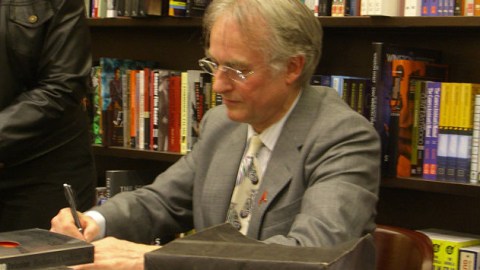Should Richard Dawkins Take Up Novel Writing?

James Wood is probably the best literary critic working today. If he wrote a review of the phone book, I would read it. This week, though, I find myself disagreeing with him. His recent piece in The Guardian, which offers a sort of literary critique of the “New Atheism,” is eloquent as always, but I have qualms about the conclusions—or non-conclusions—it draws.
Wood argues that prominent public atheists like Richard Dawkins and Christopher Hitchens pale beside serious fiction writers in the subtlety of their inquiry into religion. “I can’t be the only reader,” he says, “who finds himself in broad agreement with the conclusions of the New Atheists, while disliking some of the ways they reach them.” This is fair enough as far as it goes, although already it veers toward a quibble over style rather than substance. Wood continues:
…People’s beliefs are often not stable, and are fluctuating. We are all flip-floppers…
An essay or work of polemic finds it hard to describe the texture of such fluctuation, whereas the novelist understands that to tell a story is to novelise an idea, to dramatise it. There is no need to make a tidy solution of belief; to the novelist, a messy error might be much more interesting.
He charges the New Atheism in general with a “kind of literalism,” and calls Dawkins, in particular, “dead to metaphor.”
Normally, I’d be an eager member of the choir to which Wood is preaching. I agree that the great strength of literature is its ability to dramatize ambiguity, contradiction, ambivalence—not only about God but about every subject under the sun. But therein lies the problem: Wood’s argument here can apply to almost anything, including the very messiest kinds of human error. It can’t make any claims for religion beyond the aesthetic. The “literary interest” of a belief or behavior is no measure of its validity or desirability in the real world; in fact, these things may be diametrically opposed.
For an extreme example, take the corporal punishment of children. I recently had the pleasure of reading Alice Munro’s “Royal Beatings,” a terrific short story about a rural Canadian family struggling through the Depression. In it, the teenaged daughter, Rose, is beaten regularly by her father at the instigation of her stepmother, Flo. Neither the father nor Flo is a monster; in fact, Munro takes great pains to show that both are multifaceted, even sympathetic human beings, while Rose, for all her victimhood, is often obnoxious in the way that adolescents can be. One bad (but typical) beating is narrated with masterful psychological complexity:
The belt is coming off, not hastily. It is being grasped at the necessary point. All right you. He is coming over to Rose. He pushes her off the table. His face, like his voice, is quite out of character. He is like a bad actor, who turns a part grotesque. As if he must savor and insist on just what is shameful and terrible about this. That is not to say he is pretending, that he is acting, and does not mean it. He is acting, and he means it. Rose knows that, she knows everything about him.
We can say everything about this scene that Wood says about Melville’s or Woolf’s treatment of religion. It captures, minutely, the intense fluctuations of conscience and consciousness. It refuses to caricature or preach. In a dark way, it fascinates. We can say all this, and yet know that if we had to judge this incident publicly, our stance would be unequivocal: the beating is cruel and wrong. (Note, though, that the society Munro depicts would have felt differently; it would have tolerated or even applauded harsh punishment of children.)
The fact is that the New Atheists are mainly concerned with pragmatic, public judgments of this kind. Most of them, I think, would be happy to leave everyone to his own metaphysics if private faith weren’t so entangled with the public sphere. As it stands, one of their chief accusations is that certain religious practices, when foisted on kids, actually are a form of child abuse. I’m not thinking just of the genital mutilation of girls or the recruitment of boys into religious warfare; I mean, for example, any preaching that terrifies young people into following somebody’s idea of morality. It would be a mistake to assume that great fiction writers themselves sit the fence about this type of thing. (Remember the scene from APortrait of the Artist as a Young Man in which a hellfire sermon scares the bejesus out of young Stephen Dedalus? As a commentary on the Catholic Church Joyce grew up in, it’s pretty damning.)
Wood, however, steers clear of such sociopolitical issues. His focus is on the deep inner life of religion. At its best, he suggests, that life resembles an author’s struggle in writing a great novel, or a critic’s in wrestling with it: an intricate tapestry of passion, imagination, and doubt. I sympathize with his desire for this tapestry to keep spinning itself out forever. (Reading the essay, you suspect that Wood doesn’t dislike the way Dawkins reaches his conclusions so much as the fact that he reaches them at all.) But even if all of us were as contemplative as Wood, there would still remain the outer world of our practical dealings with each other. In that world, money and laws are made, children are educated, people kill and die, on the basis of religious claims. In that world, Dawkins’ skeptical message demands attention, even if he doesn’t always deliver it with subtlety or grace.
Is Wood seriously calling for Dawkins to adopt a more literary outlook? If so, why shouldn’t Dawkins ask that Wood’s criticism be more scientifically grounded? Sure, this unlikely tradeoff might rein in Dawkins’ tendency toward literal-mindedness and Wood’s toward fastidious abstraction. But again, it would largely be a change of style, not substance. Where religion and public life intersect, I think both men really are “in broad agreement.”
Anyway, what about Christopher Hitchens? Wood lumps him together with Dawkins as casually as he accuses the New Atheists of lumping all religious experience together. But this seems unfair, given that Hitchens is himself a part-time literary critic. Though I don’t always agree with his judgments, I think he does a credible job of balancing his disparate roles. Sometimes he raises a political megaphone or attacks specific religious claims. At other times he writes searchingly about books and the inner life, including the trials and ironies of facing death as a nonbeliever. (In doing so, by the way, he joins a long list of literary figures who have taken nonbelief as a given: Thomas Hardy, Wallace Stevens, and Philip Larkin, to name a handful. You can’t accuse these writers of lacking sensitivity to metaphor.)
At the end of his essay, Wood describes a YouTube video in which Dawkins and the Archbishop of Canterbury are “arguing past each other.” He presents himself as a detached, amused observer, claiming the middle ground between these men without claiming anything more. As much as I admire Wood, I think he’s arguing past Dawkins also, only with greater panache.





